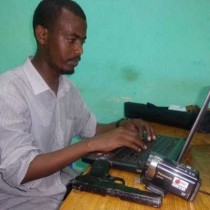
Camera in one hand and pistol in the other, Under fire, Somalia's brave journalists.
Sometimes reporting from anarchic Somalia -- where at least 18 media workers have been killed this year, double the worst on record and second only to war-torn Syria -- takes more than courage alone.
"I know that what I'm doing could be wrong ethically -- you shouldn't carry a gun and at the same a camera and a notebook," said Abdirahman, the only reporter daring to work in the former Islamist insurgent bastion of Baidoa.
"But there was no other option left... I had to either leave town as my colleagues did, or continue to work with a gun in my hand," the father of three said, a reporter for the independent Universal Television station.
Somalia's journalists are reeling from a string of attacks, including assassinations as well as those caught up in bomb blasts or killed reporting on frontline battles against Al-Qaeda linked Shebab insurgents.
Even two comedians who poked fun at the Islamists have been murdered.
Several killings are blamed on the Shebab, but other murders are also believed to be linked to struggles within the multiple factions in power.
But 27-year-old Abdirahman believes that the risks are worth running to keep a free press alive in the Horn of Africa nation, even though he fears the pistol he carries may not be enough to protect him.
"I'm the only journalist daring to operate inside Baidoa for now, and even though I'm forced to carry a gun for self-defence, one day my killers will get me," Abdirahman said.
Invading Ethiopian troops fighting alongside Somali forces seized Baidoa in February from the Shebab, with the extremist fighters fleeing the strategic town, some 250 kilometres (155 miles) northwest of Mogadishu.
But the volatile region still suffers from guerrilla attacks by the Islamists, and a 17,000-strong African Union force is still battling retreating Shebab forces to open the road between the capital and Baidoa.
Abdirahman, who worked in the city under Shebab control, said he now receives death threats from the extremists, who stage assassinations inside the city and still control surrounding regions.
"The Shebab threaten me with death threats by telephone...but I will continue working so long as I'm alive," he said.
Abdirahman's colleagues in Mogadishu face similar daily dangers, even as the city slowly returns to life, with a newly elected president and parliament struggling to rebuild stability after more than two decades of war.
"Whenever my telephone rings I fear hearing another friend has been killed," said radio reporter Hanad Ali.
International press rights groups have repeatedly voiced their concern, with Reporters Without Borders (RSF) warning Somalia "cannot continue to be abandoned... to the killers who are decimating civil society."
While the Shebab are on the back foot -- abandoning fixed positions in Mogadishu last year, and losing a string of key towns since then -- the killings continue.
The Shebab themselves deny responsibility, with senior official Ali Mohamed Hussein instead blaming government forces who he said "kill people for their petty belongings", or those angry at media criticism.
A new wave of eager but inexperienced reporters -- often working for a pittance of a wage -- have now filled the gaps left by veteran journalists killed, wounded, retired or in exile.
But Jamal Osman, a British-Somali journalist, sparked fury among colleagues when he wrote in The Guardian newspaper last month claiming that bribery for partisan reporting was fuelling the killings.
"The majority of journalists killed in Somalia are murdered as the result of a grudge," he wrote.
In the war-ravaged streets of Mogadishu, there seems little end in sight to the wave of killings.
"Journalists are constantly targeted and being killed," said Ibrahim Mohamed, from the Somali National Union of Journalists.
"What worries us most is that the crimes are done with impunity... nobody has been tried for the murders," Mohamed said, adding that seven journalists have fled into exile since September alone, while others have quit their jobs.
"I couldn't just wait by my microphone for my death to come," said former radio reporter Abdulahi Mohamed, who now hopes to leave Somalia.
Other reporters try to continue to tell Somalia's story by keeping as low a profile as possible, hoping for better days to come.
"Many journalists are confined to radio stations where they sleep and eat, they seldom see their families," said freelance reporter Zakariye Ali.
"You never know when you will be shot -- I think this country no longer has a place for journalists."
Leave a comment
| Copyright © 2009 - 2024 Sunatimes News Agency All Rights Reserved. |
| Home | About Us | Diinta | Reports | Latest News | Featured Items | Articles | Suna Radio | Suna TV | Contact Us |
 0
0 









Camera in one hand and pistol in the other, Under fire, Somalia's brave journalists.
Camera in one hand and pistol in the other, Somali reporter Abdukadir Hassan Abdirahman goes out to work on some of the most dangerous streets for journalists in the world.